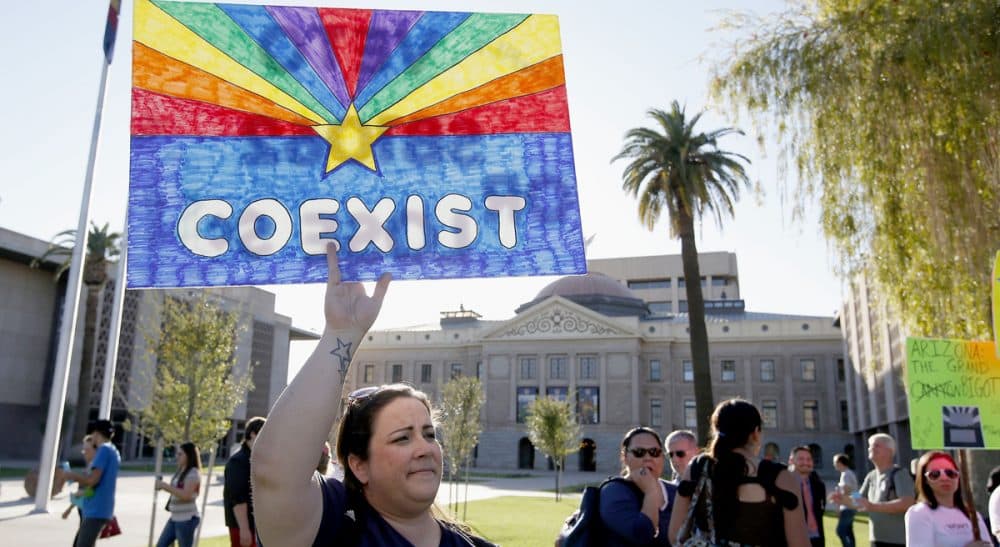Advertisement
What Arizona's 'Religious Freedom' Bill Is Really All About

Is anyone surprised by SB1062, the latest Arizona law to shock Americans-who-thought-we'd-gotten-over-all-that? Last time it was the Support Our Law Enforcement and Safe Neighborhoods Act, a.k.a. SB1070, which allowed police to stop anyone believed to be an illegal immigrant and demand their papers. The law was decried for effectively making Latino appearance a reasonable basis of suspicion and creating a license for police harassment.
This time it's a bill that, if signed by Gov. Jan Brewer, would allow business owners to discriminate against gays and lesbians if homosexuality is an affront to their religious beliefs. Well — not quite. That is how the law is being portrayed in the media, but it is both worse than that and not quite so bad.
It is worse because it affirms a right to discriminate against anyone, not just those of non-traditional sexual orientation, on the basis of religious belief.
this legislation is an attempt to anticipate 'other federal laws that may burden religious freedom.'
Yet it also is not so bad because it actually confers no new rights to discriminate. "In essence, the new law would not [change] much," Robert Volk, professor of law at Boston University, told me. Even today, "anyone can discriminate against an individual based on sexual orientation in Arizona."
This may come as a surprise. You might think that if you can't bar a black man from your lunch counter, you can't bar a gay one either. But sexual orientation, unlike race, is not protected under federal civil rights law, so it's every state for itself.
This does not mean that Arizona's law, should it make it past Governor Brewer's desk, is entirely without consequence. It would supersede local non-discrimination ordinances. For example, the city of Tucson currently bars private companies — though not private clubs, such as, presumably, the many golf clubs that pock the desert with green — from discriminating on the basis of sexual orientation. If the new law takes effect, Tucson's stronger protections will be dashed.
At its heart, though, this law is not about municipal ordinances, and it is certainly not symbolic — a spasm of indignation of the sort we've come to expect from, say, Tea Party-aligned members of the House of Representatives who have voted dozens of times to repeal the Affordable Care Act.
According to Toni Massaro, professor of law at the University of Arizona, this legislation is an attempt to anticipate "other federal laws that may burden religious freedom.” These include provisions of the ACA, which mandate that employer-subsidized health insurance cover contraceptives. Retailer Hobby Lobby and cabinetmaker Conestoga Wood Specialties Corp. have advanced legal cases against those provisions, arguing that private companies owned by religious proprietors should be allowed to seek exemption from the mandate.
It all boils down to whether for-profit companies can engage in religious practice and take advantage of the constitutionally protected freedom of religious exercise. The legal questions are almost numbingly complicated and still unsolved. The Supreme Court will take up the Hobby Lobby and Conestoga cases this term.
But, looking into the future, what if these businesses succeed? What if the court agrees that free enterprise should be allowed to claim free exercise, just as Arizona's legislature has now determined that the possession of sincerely held religious beliefs should allow business operators to claim exemptions from non-discrimination rules, such as Tucson's?

Massaro has a solution in mind: require businesses that discriminate to disclose this fact. After all, exemption from anti-discrimination laws would be no secret: when the object of their discrimination comes a’calling, the businesses would have to announce their position to spurned customers. Disclosure would help unwanted patrons to avoid humiliation and wasted time.
As Massaro well understands — she defends her recommendation in an as-yet unpublished paper — a disclosure mandate would face its own legal challenges. Any time the government compels speech, free expression concerns arise.
A scenario in which businesses are allowed to discriminate without notice — a real possibility — may seem intractable, but, even then, there is room for citizen action. Armed with social media and wiki-style crowd sourcing, it would be simple for opponents of discrimination to compile and publish lists of offending businesses, to subject them to criticism, and to locate targets for boycotts.
Whether for-profit companies should be allowed religious exemptions from non-discrimination laws in the first place, and whether the conferral of such exemptions should compel disclosure — these are hard questions that must be given thoughtful attention in a pluralistic society that allows room for differences of opinion.
But for those who reject discrimination, the course is clear. If exemptions eventually are granted, punish with your wallet.
Related:
